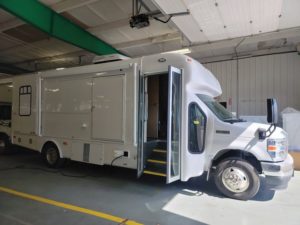WELLFLEET — Medication-assisted treatment for addiction is going through a decades-long transformation from being almost as stigmatized as the illegal drugs themselves to being recast as a critical component of long-term recovery.

The medications used for that treatment include methadone, buprenorphine, and naloxone, though methadone, now a preferred treatment in many cases, can, due to federal laws, be dispensed only in daily doses for most patients, especially those in recent recovery. The problem: the only methadone clinic on Cape Cod is in South Yarmouth, and Outer Cape residents who receive methadone must make a one-hour journey there and back daily for treatment.
That could soon change. A clinic to dispense Methadone in Wellfleet is under consideration.
Acadia Healthcare, the Tennessee-based company that owns the Cape’s only methadone clinic in Yarmouth, will come before the zoning board of appeals on Thursday, Aug. 11 seeking a special permit to operate a mobile clinic to provide medically supervised treatment seven mornings per week, according to the company’s application.
The requested permit would allow Acadia to operate its mobile treatment bus from 6 a.m. to 9 a.m. at the rear of the parking area of the strip mall that houses the Outer Cape Health Services Pharmacy and the Wellfleet Veterinary Hospital at 2700 Route 6.
Outer Cape Health Services (OCHS) offers Suboxone — a combination medication containing buprenorphine and naloxone — as part of its substance abuse treatment program. But it does not offer methadone, which is very tightly regulated.
Although OCHS personnel would not respond to requests for comment from the Independent, CEO Patricia Nadle wrote a letter to the ZBA supporting Acadia’s application.
“Today, many members of the Outer Cape communities spend several hours each day commuting to the South Yarmouth location for this medication,” Nadle wrote. “The inconvenience and disruption of these trips often contribute to their stopping this important opioid use disorder treatment and ultimately their recovery plan. This service is critical to our Outer Cape communities.”
A spokesperson for Acadia, Larry Larsen of KWT Global, said the company currently has one mobile van operating in Massachusetts and five others in other states. Larsen said this is the only mobile unit they are trying to deploy on the Cape at this time.
A Treatment Plan
Acadia explained its Wellfleet plan as follows: a 23-foot-long bus would roll in every morning with daily doses for clients, who would be instructed to park on the property and wait in their cars “for mobile clinic security personnel to approach and conduct patient check-in,” the application narrative states.
“Through careful scheduling and appointment allocation, Acadia expects no more than 5 to 10 patient cars on site at any given time,” according to the narrative. Patients would be required to wait in their vehicles until called to enter the clinic.
The bus would return to South Yarmouth each evening. No alteration of the current landscaping or parking area would be necessary, the application states. The medications would be housed in a safe inside the van. There would be alarms and security systems, as required by the U.S. Drug Enforcement Agency (DEA).
Acadia is in the process of applying for the required approvals from the DEA, the state Dept. of Public Health, and the Substance Abuse and Mental Health Services Administration (SAMHSA), according to Larsen.
Evolution of Medication
Buprenorphine, an ingredient in two newer opioid addiction medications — with the brand names Suboxone and Subutex — was legalized in 1985. These medications got a major boost when the Drug Addiction Treatment Act was passed in 2000. It allowed physicians to prescribe the medications from their offices, thus avoiding the daily commute to a methadone clinic. Doctors have to take an eight-hour course to prescribe Suboxone, and the law limits the number of prescriptions doctors can make each year.
First invented to help soldiers with pain, methadone was legalized in 1973 for treatment of opiate addiction. It is highly regulated because of its potential for abuse.
But with the advent of fentanyl as the main ingredient in street opioids, the older approach, methadone, is now the preferred treatment again, said Dr. Ruth Potee, a board-certified family physician and addiction medicine physician who works in Western Massachusetts.
That’s because fentanyl is so strong and lingers for so long in the body that people seeking treatment must wait for six days to be drug-free enough to take Suboxone without the medication sending them into withdrawal, Potee said.
“The regulations on methadone need to be examined,” Potee told the Independent last month. She argues that methadone should be made available at pharmacies and monitored the same way other potentially addictive drugs are. Meanwhile, she said, “the Cape is a place that needs a van.”
In June 2021, the DEA did change its regulations to allow registered and licensed methadone clinics to operate a “mobile component,” acknowledging the geographic challenges.
Mobile methadone is also a hot topic before the Opioid Recovery and Remediation Fund Advisory Council. That is the 21-person advisory board reviewing and recommending how the state Executive Office of Health and Human Services (EOHHS) should spend the $347 million the Commonwealth will receive by 2038 in settlement funds from lawsuits against opioid pain medicine purveyors who fueled the sweeping opioid addiction crisis.
In October, the council put out requests for proposals to increase access to methadone, and currently two mobile methadone proposals are being reviewed by the EOHHS. The Independent has made a formal records request to get the details of the proposals because the state’s spokeswoman would not disclose them.
Editor’s note: An earlier version of this article, published in print on Aug. 4, incorrectly reported that Acadia Healthcare is based in Kentucky. It is based in Nashville, Tenn. Because of erroneous information in Acadia’s application to the town, it was also reported that all the required approvals from state and federal agencies had been secured. In fact, they are still in process.
